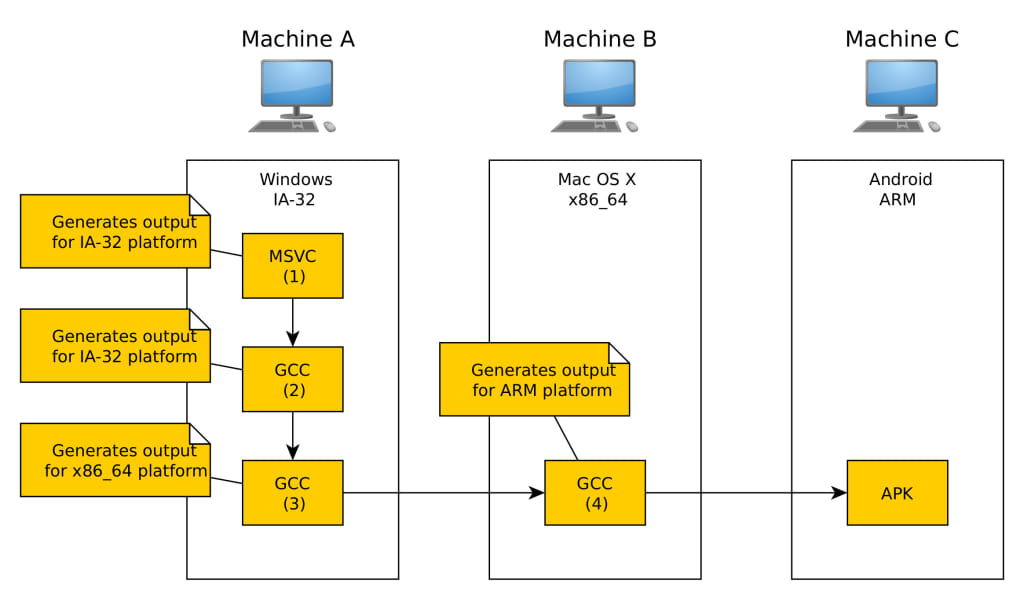Cross Compilation in Linux: Enhancing Your Development Journey
Why did the programmer bring a pair of shoes to their cross-compilation session? To make sure that the code can "run" on any platform.

In the realm of Linux development, cross-compilation is a technique that allows developers to build software for a target platform different from the one on which they are working. Recently, I encountered a challenge in my software development journey. I needed to compile code for a target machine that operated on the ARM aarch64 architecture, while I was working on my trusty Ubuntu system. This presented an opportunity to explore the world of cross-compilation and delve into the intricacies of building software for a different platform.
- Download and install the compiler of the target architecture
- Develop your software, write successful unit tests, and compile your source code
- Verify if compiled code indicates the target executable type using the file utility
Building for Different Architectures
Cross-compilation empowers developers to create software for various target architectures without needing dedicated hardware for each platform. It allows you to compile code on a host machine while generating binaries that can be executed on the target platform. This capability is especially valuable when working with embedded systems, IoT devices, or diverse computing environments.
Increased Development Efficiency
Cross-compilation significantly enhances development efficiency by reducing the time and effort required to build software for multiple platforms. Instead of switching between different physical or virtual machines, developers can leverage cross-compilation to compile, test, and deploy their code from a single development environment. This streamlines the development workflow, accelerates iteration cycles, and boosts overall productivity.
Improved Debugging and Testing
Cross-compilation facilitates efficient debugging and testing processes by allowing developers to compile and run their code on a host machine while targeting a different platform. In my Ubuntu development setup, I experienced the power of cross-compilation as I developed and wrote unit tests for a target architecture different from my own. This approach allowed me to leverage the familiarity and convenience of my Ubuntu environment, enabling efficient debugging and testing processes. By catching and resolving issues early on, I could deliver robust software while saving valuable time and resources.
Optimal Resource Utilization
Cross-compilation enables the optimization of system resources by offloading the heavy lifting of compilation to more powerful machines. This is particularly advantageous when working with resource-constrained devices, where compiling directly on the target platform may be slow and resource-intensive. By utilizing cross-compilation, developers can efficiently utilize the available resources and shorten development time.
Flexibility and Portability
Cross-compilation enhances flexibility and portability by allowing developers to build software on one platform and deploy it on various target platforms. This flexibility is beneficial when working with different Linux distributions, embedded systems, or custom hardware. It ensures that software can be easily adapted and deployed across diverse environments, providing wider reach and compatibility.
Collaboration and Distribution
Cross-compilation simplifies the collaboration and distribution of software across different platforms. Developers can share pre-compiled binaries, libraries, and toolchains, eliminating the need for recipients to compile the code themselves. This reduces potential compatibility issues and enables faster and smoother collaboration between developers working on different platforms.
Conclusion

Cross-compilation is a vital skill for Linux developers seeking to optimize their workflow, increase productivity, and target multiple platforms efficiently. It empowers developers to build software for different architectures, improves development efficiency, facilitates debugging and testing, optimizes resource utilization, enhances flexibility and portability, and simplifies collaboration and distribution.
By mastering cross-compilation, developers can unlock a world of possibilities and overcome the challenges associated with building software for diverse platforms. Embrace the power of cross-compilation and take your Linux development skills to new heights, allowing you to deliver high-quality software across a wide range of target environments.





Comments
There are no comments for this story
Be the first to respond and start the conversation.